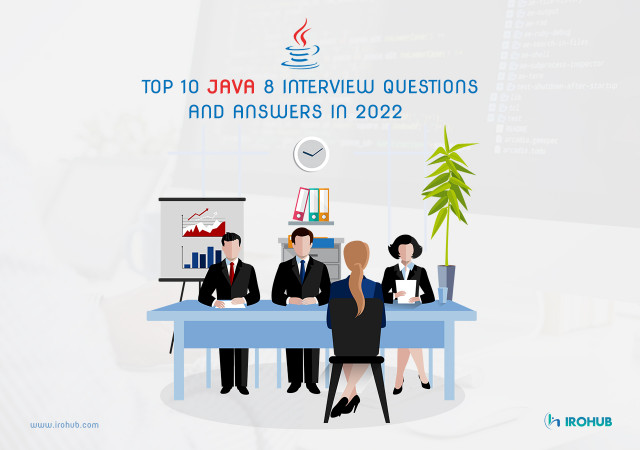Java is a widely used programming language that can be found in everything from Android apps to the Internet of Things (IoT). According to some studies, Java was the most popular job posting language in 2019. It should come as no surprise that there is still a considerable need for individuals who are knowledgeable in Java given its widespread use.
For that reason, we are giving this compilation of the most typical Java 8-related interview questions and responses. It's not enough to have in-depth knowledge and training in a particular field (in this case, for instance, Java). You must arrange your ideas, analyze the available data, and concentrate on the questions that are most likely to be asked.
Let's go through the basics of Java 8 here and define it before we tackle the questions. The latest version of Java, known as Java 8, was launched on March 14, 2014, and according to Java, it "contains new features, enhancements, and bug fixes to improve efficiency to develop and run Java programmes."
Top 10 Java 8 Interview Questions
- What is Java 8 StringJoiner class used for?
Users can generate a string by passing delimiters like hyphens and commas by using the Java 8 StringJoiner class, which creates a sequence of characters separated by a delimiter.
- Define Lambda Expression, and the purpose to use them?
It is a function where an object may be shared and referenced. Lambda Expressions allow users to encapsulate one behavior unit to send around to other applications, need less coding, and give a way to implement the Java 8 functional interface.
- In the context of Java 8, what does the phrase "method reference" mean?
Java 8's method reference construct allows you to refer to a method without actually calling it. It is a convenient way to express lambdas.
- What is optional, and how should it be applied?
A new container class called Optional, which is created in the java.util package, is used to represent optional items that are either present or absent. The main advantage of optional is that null checks are avoided, and run-time "NullPointerException" consequences are eliminated.
- What is Type Inference?
By examining each method invocation and associated declaration, type inference enables the compiler to discover the parameter types.
- Why are default methods needed in the interface?
You can enhance the functionality of your libraries' interfaces by using default methods, which also guarantee binary compatibility with earlier interface-specific code.
- How does a stream vary from a collection, and what is it?
An iterator called a stream performs the task of accepting a set of instructions and applying them to each of the elements it contains. An object sequence from a collection or other source that allows for aggregate operations is represented by a stream. Iteration logic is implemented inside the stream, as opposed to collections. Additionally, unlike collections, streams are intrinsically loaded and processed slowly.
- What is a default method, and under what circumstances is it used?
The interface contains the default method, which entails an implementation. While maintaining backward compatibility with the classes that already implement the interface, the method enhances an interface with additional functionality.
- Explain what Nashorn is, and mention what advantages does it provide?
The new JavaScript processing engine, Nashorn, came pre-installed with Java 8. Mozilla Rhino was formerly used by the Java platform. Nashorn outperforms its predecessor in terms of run-time performance and better conformance with ECMA normalised JavaScript requirements.
- What is stream pipelining?
Chaining various procedures together is known as stream pipelining. This task is completed via pipelining, which divides stream operations into intermediate operations and terminal operations. Each intermediary operation completes and returns a stream instance. In order to handle data, a user can therefore build up any number of intermediary actions, constituting a processing pipeline.
A terminal operation that returns a final value and ends the pipeline must be present at the process's conclusion.
- Do You Want a Career in Java?
You can become an expert in Java by taking the Java training programmes iROHUB Infotech has to offer, increasing your chances of passing the job interview.
The goal of the Java Training in Kochi we provide is to take you step-by-step through the Java principles, from basic programming approaches to more complex ones. The course gives you practical experience with JDBC and the JUnit framework together with knowledge of Core Java 8's operators, arrays, loops, methods, and constructors.
You will receive hours of instruction, multiple Core Java 8 code tasks, and placement assistance. Enroll in the Java Program if you wish to advance your Java career. In order to build highly scalable online projects, you'll study more than 30 of the most in-demand skills. The professional who already has Java training and knowledge but wants to upskill can also choose this curriculum.
Whichever path you decide to take, iROHUB is prepared to support you as you progress toward a better, more interesting, and rewarding profession. Go to iROHUB Infotech right away to begin going!
I hope you enjoyed reading this article on java 8 interview questions. If you have any queries, please post them below in the comment section or give us a call. We are happy to assist you.








Post Comments (0)